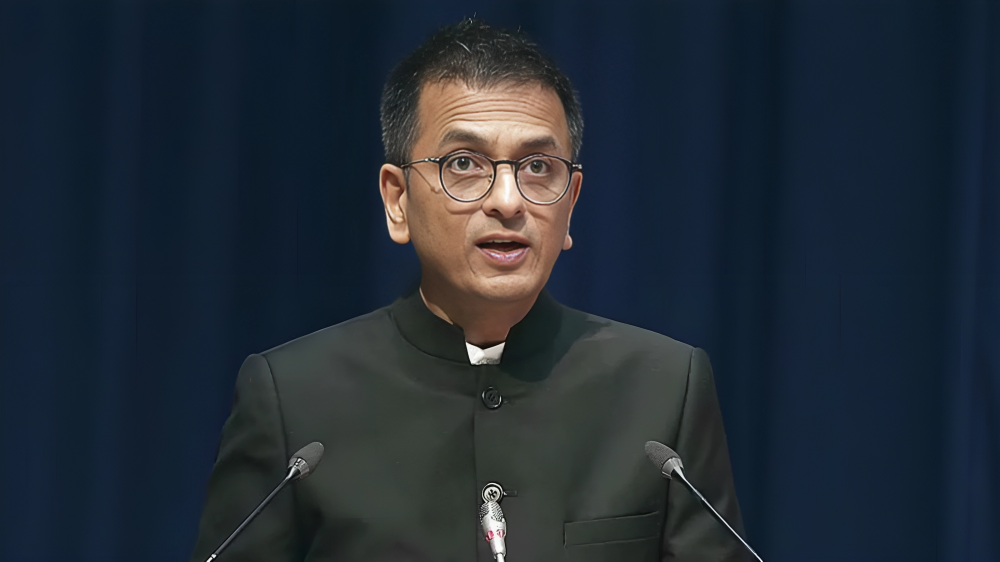Chief Justice of India Emphasizes the Significance of Constitutional Morality

Image Source: Hindustan Times
Chief Justice of India, D Y Chandrachud, underlined the importance of constitutional morality and its alignment with universal constitutional values during an insightful interview with The Indian Express. Reflecting on the intricacies of Indian culture and its interpretation through constitutional principles, he advocated for an understanding that acknowledges the Constitution’s role in reforming societal practices.
CJI Chandrachud affirmed that while some argue about cultural contradictions in assessing Indian practices through the constitutional lens, certain constitutional values stand universally accepted. He emphasized that the Constitution, a document tailored to suit Indian conditions, consciously incorporates provisions from diverse jurisdictions, ensuring citizen protection from religious, caste, and ethnic dominance.
Acknowledging the uniqueness of India’s constitutional framework, he highlighted provisions such as the abolition of untouchability and the Directive Principles of State Policy, framing India’s social obligations, including free legal aid and environmental protection.
Elucidating the evolution of the Constitution through over a hundred amendments, Chandrachud showcased how successive generations voiced their aspirations and needs through parliamentary processes. He cited the creation of instrumental governmental structures like Panchayats and the GST Council through constitutional amendments as quintessentially Indian.
CJI Chandrachud urged understanding the Indian Constitution as a dynamic document embodying universal values while continuously adapting these principles to address India’s evolving challenges. He emphasized that the Constitution isn’t just a foreign import but a document conceived, amended, and operated by Indians themselves.
Addressing potential tensions between constitutional morality and entrenched social practices, he advocated for embracing constitutional values to reform societal norms, particularly in areas concerning religion, caste, and cultural identities. Furthermore, he highlighted the Supreme Court’s commitment to diversity in the appointment of judges, emphasizing gender, caste, and regional representation as crucial factors in ensuring a balanced judiciary.
Regarding the role of courts and Parliament in fostering social dialogue, the CJI delineated the distinct roles and powers of each institution, highlighting their complementary nature. He emphasized that while Parliament passes legislation to drive significant social change, the Court intervenes in individual cases of rights violations, functioning as a mediator and enabling citizens to seek redressal.
In conclusion, Chandrachud stressed the symbiotic relationship between the judiciary and Parliament, exemplified by instances such as the Vishakha guidelines against workplace harassment, indicating a collaborative effort in facilitating social dialogue while respecting institutional boundaries outlined in the Constitution.
Team Profile

- News Writer
- Harshit Tokas is a Political Science and International Affairs Post-Graduate with a passion for understanding and analyzing complex political landscapes. Skilled in research, data analysis, and policy development. Eager to contribute his knowledge and insights to drive positive change.
Latest entries
 English1 December 2023Ambati Rayudu Backs Ruturaj Gaikwad as a Future Leader of Indian Cricket
English1 December 2023Ambati Rayudu Backs Ruturaj Gaikwad as a Future Leader of Indian Cricket English1 December 2023Changing Tide: Pujara and Rahane Omitted from South Africa Tour Squad
English1 December 2023Changing Tide: Pujara and Rahane Omitted from South Africa Tour Squad Defence1 December 2023India Greenlights Procurement of Advanced Military Assets in Multi-billion Defence Upgrade
Defence1 December 2023India Greenlights Procurement of Advanced Military Assets in Multi-billion Defence Upgrade English1 December 2023Delhi Government Pushes for Completion of Asia’s Largest Wastewater Treatment Plant
English1 December 2023Delhi Government Pushes for Completion of Asia’s Largest Wastewater Treatment Plant









